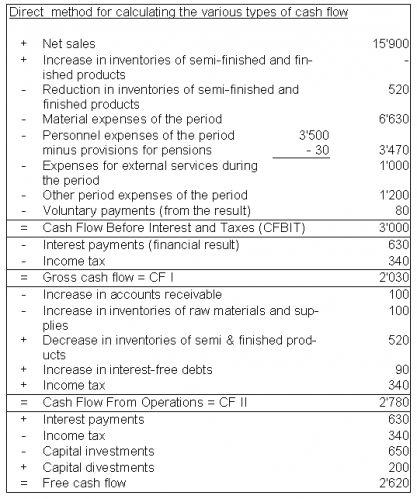Difference between revisions of "Cash flow"
From ControllingWiki
Achtung. Sie nutzen eine nicht mehr unterstützte Version des Internet Explorer. Es kann zu Darstellungsfehlern kommen. Bitte ziehen Sie einen Wechsel zu einer neueren Version des Internet Explorer in Erwägung oder wechseln Sie zu einer freien Alternative wie Firefox.| [unchecked revision] | [quality revision] |
| (7 intermediate revisions by 7 users not shown) | |||
| Line 1: | Line 1: | ||
== IGC-DEFINITION (abbreviated) == | == IGC-DEFINITION (abbreviated) == | ||
| − | '''Cash flow'''<br> | + | '''Cash flow / [[:de:Cash Flow|Cash Flow]]'''<br> |
Cash flow is a sales surplus over the liquidity-relevant expenses incurred by a company’s business activities and is therefore also an indicator for a company’s profit situation as well as its self-financing capability. | Cash flow is a sales surplus over the liquidity-relevant expenses incurred by a company’s business activities and is therefore also an indicator for a company’s profit situation as well as its self-financing capability. | ||
Various cash flow concepts may be distinguished, depending on the purpose of the analysis and appraisal. First it has to be decided whether extraordinary and neutral transactions should be included or not; here we are only concerned with the ordinary account, i.e. cash flow resulting from normal business activities. Then a decision has to be made as to which fund to start with, since this decision determines which transactions are to be regarded as liquidity-relevant. A fund is defined as the balance of one or more balance sheet accounts used to measure the change in liquidity: | Various cash flow concepts may be distinguished, depending on the purpose of the analysis and appraisal. First it has to be decided whether extraordinary and neutral transactions should be included or not; here we are only concerned with the ordinary account, i.e. cash flow resulting from normal business activities. Then a decision has to be made as to which fund to start with, since this decision determines which transactions are to be regarded as liquidity-relevant. A fund is defined as the balance of one or more balance sheet accounts used to measure the change in liquidity: | ||
Latest revision as of 13:47, 4 June 2020
IGC-DEFINITION (abbreviated)
Cash flow / Cash Flow
Cash flow is a sales surplus over the liquidity-relevant expenses incurred by a company’s business activities and is therefore also an indicator for a company’s profit situation as well as its self-financing capability.
Various cash flow concepts may be distinguished, depending on the purpose of the analysis and appraisal. First it has to be decided whether extraordinary and neutral transactions should be included or not; here we are only concerned with the ordinary account, i.e. cash flow resulting from normal business activities. Then a decision has to be made as to which fund to start with, since this decision determines which transactions are to be regarded as liquidity-relevant. A fund is defined as the balance of one or more balance sheet accounts used to measure the change in liquidity:
from: IGC-Controller-Wörterbuch, International Group of Controlling (Hrsg.)

